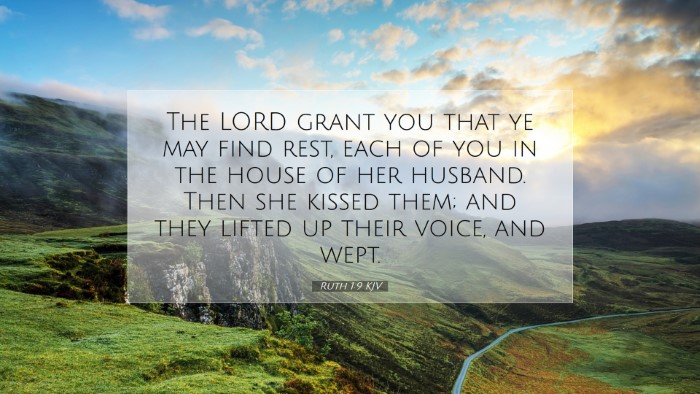Old Testament
Genesis Exodus Leviticus Numbers Deuteronomy Joshua Judges Ruth 1 Samuel 2 Samuel 1 Kings 2 Kings 1 Chronicles 2 Chronicles Ezra Nehemiah Esther Job Psalms Proverbs Ecclesiastes Song of Solomon Isaiah Jeremiah Lamentations Ezekiel Daniel Hosea Joel Amos Obadiah Jonah Micah Nahum Habakkuk Zephaniah Haggai Zechariah MalachiRuth 1:9
Ruth 1:9 KJV
The LORD grant you that ye may find rest, each of you in the house of her husband. Then she kissed them; and they lifted up their voice, and wept.
Ruth 1:9 Bible Commentary
Commentary on Ruth 1:9
Bible Verse: Ruth 1:9 - "The LORD grant that you may find rest, each of you in the house of your husband." Then she kissed them, and they lifted up their voices and wept.
This single verse encapsulates not only the depth of Naomi’s love for her daughters-in-law but also serves as a key moment in the unfolding narrative of the Book of Ruth. It presents themes of loyalty, provision, and the deep bonds of familial relationships. Let's explore various insights from public domain commentaries.
Insights from Matthew Henry
Matthew Henry emphasizes Naomi's deep concern for Ruth and Orpah, her daughters-in-law. He notes that Naomi’s farewell is marked by maternal instincts filled with hope for their future.
- Naomi's Blessing: Naomi’s wish for them to find rest is significant. It is a blessing, communicating a desire for peace and security in their lives after experiencing great loss.
- Understanding 'Rest': The term 'rest' can be interpreted in several ways, including emotional peace, physical security, and social stability, which a husband would provide in that historical context.
- Emotional Weight: The act of kissing and the emotional response (weeping) highlights the strength of their bond, adding a poignant layer to the passage.
Insights from Albert Barnes
Albert Barnes provides a historical and cultural context to Naomi’s words, drawing attention to the social mores of the time.
- Naomi's Role: As a mother-in-law, Naomi's concern demonstrates her role as a protector. She understands that, in a patriarchal society, a woman's security largely depended on her husband.
- Symbolism of 'Husband': In the ancient Near Eastern cultural context, the husband symbolizes both protector and provider, indicating a return to stability after the chaotic events of widowhood.
- Spiritual Implications: Barnes suggests that Naomi’s prayer to God for them reflects her faith in divine providence, recognizing that ultimately, it is God who grants every good gift.
Insights from Adam Clarke
Adam Clarke elaborates on the relationship dynamics present in Ruth 1:9, highlighting the themes of loyalty and devotion between the characters.
- Emotional Dynamics: Clarke points out the emotional intensity surrounding the parting, as both Ruth and Orpah are faced with the distress of leaving their mother-in-law.
- Choice of Departure: The decisions of Ruth and Orpah to return to their respective families symbolize opportunities for independence, but also reflect the cultural expectations placed upon them as women.
- God’s Providence: Clarke notes that the blessing spoken by Naomi can also be seen as a foreshadowing of God's providence, as both women will later play crucial roles in the lineage of David and, ultimately, in the Messianic line.
Theological Significance
This verse not only serves as a poignant farewell but also initiates a transformation in Ruth's life—a key pivot in the biblical narrative. The deep emotional engagement witnessed in this verse points to the broader biblical theme of covenant loyalty.
- Covenant Loyalty: The bond of family, as demonstrated in Ruth's eventual choice to stay with Naomi, reflects the covenant loyalty (hesed) that is foundational to the theology of Israel.
- Rest as a Spiritual Concept: The quest for 'rest' extends beyond mere physical comfort into the realm of spiritual fulfillment, inviting readers to contemplate the rest that God provides.
- Foreknowledge of Redemption: This moment foreshadows God’s plan for redemption through Ruth, whose inclusion in the lineage of Christ emphasizes the role of gentiles in salvation history.
Conclusion
Ruth 1:9 serves as a microcosm of the larger themes found within the Book of Ruth. It speaks not only to the relationships formed in hardship but also to the hope and provision that follow. As pastors, students, theologians, and Bible scholars reflect on this verse, they are invited to consider its depth in the context of covenant loyalty, divine providence, and ultimately, a redemptive narrative that extends to all of humankind.


